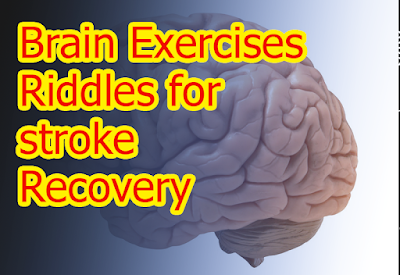Riddles and Puzzles for Brain Exercises
Stroke is a serious medical condition that occurs when blood flow to the brain is disrupted, causing brain cells to die. This can result in a range of physical, emotional, and cognitive difficulties that can impact a person's quality of life. Stroke survivors often require rehabilitation to help them regain their mobility, speech, and other abilities.
However, the cognitive
effects of a stroke, such as memory loss, difficulty with concentration and
problem-solving, can also have a significant impact on daily life. In this
article, we will explore some brain exercises for stroke recovery that can help
improve cognitive function and overall quality of life.
Disclaimer: The information provided in this article is for
educational and informational purposes only and is not intended to be a
substitute for professional medical advice, diagnosis, or treatment. Always follow your physician or other healthcare providers for advice regarding your medical condition. Stroke recovery can
be a complex process, and it is important to work with your healthcare team to
develop an individualized plan that meets your specific needs and goals. The
exercises and activities described in this article may not be suitable for
everyone and should only be performed under the guidance of a qualified
healthcare professional.
Memory Games
Memory games are a fun and effective way to
help improve cognitive function. They help to strengthen short-term memory,
which is essential for daily activities such as following instructions,
remembering appointments, and keeping track of medications. Memory games can
include card games, word games, and other brain teasers.
Here are few riddles and brain teasers which can be helpful for you.
What starts with an E, ends with an E, but only contains one letter?Click to Find Answer
An envelope)
I am not alive, but I grow; I don't have lungs, but I need air; I don't have a mouth, but I need water to live. What am I?
Click to Find Answer
(answer: Fire)
What is always in front of you but can't be seen?
Click to Find Answer
(answer: The future)
The more you take, the more you leave behind. What am I?
Click to Find Answer
(answer: Footsteps)
I have cities, but no houses. I have mountains, but no trees. I have water, but no fish. What am I?
Click to Find Answer
(answer: A map)
I am taken from a mine and shut up in a wooden case, from which I am never released, and yet I am used by almost every person. What am I?
Click to Find Answer
(answer: Pencil lead)
What has a head, a tail, is brown, and has no legs?
Click to Find Answer
(answer: A penny)
Sudoku
It is a popular number puzzle game that can help
improve cognitive function. It requires concentration and problem-solving
skills, and can help improve memory and attention to detail. Sudoku puzzles can
be found in newspapers, puzzle books, and online.
Brain Training Apps
There are a variety of brain training
apps available that are specifically designed to help improve cognitive
function. These apps often include a range of games and puzzles that can help
with memory, attention, and problem-solving skills. Some popular brain training
apps include Lumosity, Elevate, and Peak.
Reading and writing
Reading and writing are great ways to
help improve cognitive function. Reading helps to improve vocabulary, memory,
and attention span, while writing helps to improve problem-solving and critical
thinking skills. Reading and writing can be done in a variety of forms,
including books, articles, and journals.
Physical exercise
Physical exercise is important for overall
health and can also help improve cognitive function. Exercise increases blood
flow to the brain, which can help improve memory and attention. It also helps
to reduce stress and depression, which can have a negative impact on cognitive
function. Exercise can include activities such as walking, swimming, and yoga.
Socializing
It is an important part of stroke
recovery and can also help improve cognitive function. Engaging in social
activities can help improve memory, attention, and problem-solving skills. It
can also help reduce stress and depression, which can have a negative impact on
cognitive function. Social activities can include joining a support group,
volunteering, or attending social events.
In conclusion, brain exercises can play an important role in
stroke recovery. These exercises can help improve cognitive function, memory,
attention, and problem-solving skills, which can have a positive impact on
overall quality of life. Stroke survivors should work with their healthcare
team to develop a plan that includes physical and cognitive exercises, as well
as social activities, to help them recover and regain their independence.



0 Comments